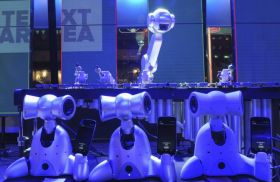Jul 21 2015
A team of robots and researchers from Georgia Tech’s Center for Music Technology is headed to Washington, D.C., to play a concert at the historic Kennedy Center. Professor Gil Weinberg and his machines, Shimon and three Shimi robots, will perform July 22 on the Center’s Millennium Stage.
The performance is part of the Smithsonian Institution and Kennedy Center’s 25/40 celebration, which commemorates the 25th anniversary of the Americans with Disabilities Act and the 40th year of VSA, the international organization on arts and disability.
 Georgia Tech robots Shimon and Shimi will play with human musicians at the Kennedy Center in Washington D.C.
Georgia Tech robots Shimon and Shimi will play with human musicians at the Kennedy Center in Washington D.C.
They’ll also be joined onstage by percussionist Jason Barnes, who wears a prosthetic drumming arm invented by Weinberg. Rounding out the robotics super group will be Director of Georgia Tech Athletic Bands Chris Moore, Ph.D. candidate Mason Bretan, bassist Michael Bowie and trumpet player Dovonte McCoy.
Weinberg said the hour-long performance will begin with Shimon and Shimi doing what they do best - improvising and playing music based on artificial intelligence and algorithms. But this 30-minute jam session represents a gigantic step forward in the robots’ musical abilities, Weinberg said.
“It’s the first time, ever, that we will play a full evening program,” he said. “My research has always been about, ‘Let’s try this algorithm, let’s see if the robot can understand this way or improvise that way.’”
For seven years, Weinberg has experimented with Shimon’s artificial intelligence, teaching the robot to play a marimba while improvising and reacting to live musicians. Now, Shimon, the Shimis and crew will perform original music that showcases their signature blend of human and machine. Weinberg, Bretan and Moore have written six original pieces for the performance.
At the halfway point of the show, Barnes will join the group on stage. That’s when Weinberg will explain to the audience that all the technology they’ve witnessed in the first part of the show is actually inspiring similar technology for people with disabilities - as evidenced by Barnes’ cyborg drumming arm.
Barnes has become a more expressive drummer through the help of the drumming arm, Weinberg said.
“He can play things that humans can’t play, anything from speed to complexity,” said Weinberg. “The pieces Jason plays will start as soft and detailed and sophisticated. They’ll grow to something much crazier, upbeat, showing the speeds and polyrhythms and all the unique things that only this arm can play.”
Ultimately, Weinberg said, the focus of the 25/40 performance is making music that is emotional. Up until now the value of the music Shimon made was for research purposes, but this music is to entertain an audience and have more traditional artistic merit.
“It actually got to the point where we can think about the music and how to create beautiful, expressive, emotional music that will touch people. Of course, AI is always there, but now it’s not the only thing that’s there.”